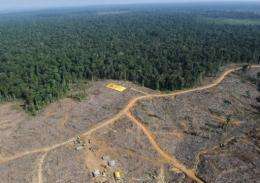File photo shows Greenpeace activists displaying a protest banner with a message "APP stop destroying tiger forest" at the PT. Tebo Multi Agro concession affiliated with Asia Pulp and Paper (APP) in the province of Jambi. A coalition of green groups in Indonesia has criticised a moratorium on deforestation as "weak", saying the year-long ban still excludes large tracts of the country's forests
A coalition of green groups in Indonesia on Thursday criticised a moratorium on deforestation as "weak", saying the year-long ban still excludes large tracts of the country's carbon-rich forests.
Greenpeace, which is leading the coalition, said government maps that mark protected areas exclude 3.5 million hectares (8.6 million acres) of peatland -- biodiverse swamp-like forests that hold rich carbon reserves.
Greenpeace said the government must review all existing logging permits on the country's natural forests and peatland, and improve governance based on an accurate set of maps.
"The government cannot hope to improve forest governance and ensure the effectiveness of the moratorium without taking these crucial steps," Greenpeace Southeast Asia political campaigner Yuyun Indradi said in a statement.
An earlier review of the maps by the Union of Concerned Scientists found that the moratorium leaves almost 50 percent of Indonesia's 100 million hectares of natural forest and peatland unprotected.
"The current moratorium is weak and does very little in effect to protect the forests," said Deddy Ratih, a forest campaign manager for Friends of the Earth Indonesia.
The two-year moratorium came into effect last year as the centrepiece of a deal with Norway, which pledged $1 billion to Indonesia under a UN-backed scheme to reduce emissions from deforestation.
That deal was part of a larger commitment made by President Susilo Bambang Yudhoyono in 2009 to reduce greenhouse gas emissions from levels that year by 26 percent by 2020, or 41 percent with international support.
The coalition charged that the moratorium -- which was originally supposed to include all natural forests -- had been watered down to protect just older primary forests and peatland because of pressure from big business.
Indonesia is often cited as the world's third-biggest emitter of greenhouse gases, due mainly to rampant deforestation by the palm oil, mining and paper industries.
(c) 2012 AFP






















